The story behind the man acquitted of all crimes after he shot President Reagan due to his belief that it would impress an actress and cause her to fall in love with him.
Hinckley's Obsession with Jodie Foster
After watching the movie "Taxi Driver" in 1976, a young man named John Hinckley became obsessed with Jodie Foster, an actress in the film. He watched the movie 15 times, about a mentally deranged man played by Robert DeNiro, who carried out a rescue mission to save a 12-year-old prostitute portrayed by Jodie Foster. Additionally, in the movie, DeNiro's character carried out an assassination attempt on a U.S. Senator and front-running Presidential candidate. Hinckley began identifying strongly with DeNiro's character in the film and started obsessing over Jodie Foster. Over the next few years, Hinckley followed Foster around the country in hopes of creating a romantic relationship with her. After reading that Foster was enrolled at Yale University in an issue of People magazine in 1980, Hinckley signed up for a writing course there and looked for Foster at the campus.
Furthermore, He wrote numerous letters and notes to her in late 1980, called her twice, and refused to leave her alone even after being told that she was not interested in forming any relationship with him. Hinckley believed that if he became a national figure, he would be equal to Foster and could attract her successfully. During this time, Hinckley remembered the plot of "Taxi Driver" and concluded that he could win Foster by assassinating the President. Since Jimmy Carter was completing his final term during this time, Foster began following him, hoping to attack at the right moment. But after being flagged by the secret service for getting too close to President Carter, Hinckley decided to shift his focus to newly elected President Ronald Reagan. On March 28, 1981, Hinckley took a bus to Washington D.C. and planned on assassinating President Reagan in the following days. Due to the risk of being killed during the encounter, he wrote but did not mail a letter to Foster about two hours before his attempt on the President's life. He stated he would "abandon the idea of getting Reagan in a second if I could only win your heart and live out the rest of my life with you." On March 30, 1981, President Reagan walked out of a Hilton after delivering a speech. As he left, Hinckley, believing he wouldn't get a better chance to take the President's life, rapidly fired a Röhm RG 14 .22 LR blue steel revolver six times in 1.7 seconds, missing the President with all six shots. The first bullet struck the brain of press secretary James Brady causing irreversible damage. The second bullet hit policeman Thomas Delahanty in the back. The third shot went over President Reagan and hit a building. The fourth shot was taken by secret service agent Tim McCarthy in the chest as he extended his body and posed as a shield to protect the President. The fifth shot hit the bullet-proof glass of the President's limousine. The sixth and final bullet nearly killed the President by ricocheting off the car and hitting him in the chest as he was pushed into the vehicle. The bullet grazed his rib and lodged in his lung, just inches from his heart. At first, officers assumed that the shot missed the President, and the limousine headed for the White House. However, the President began coughing up blood, and the limousine started to rush to George Washington University Hospital, where the President underwent two hours of life-saving surgery. Within seconds of firing the first shots, Hinckley was tackled by a swarm of individuals, including secret service agent Dennis McCarthy. John Hinckley was arrested and charged with Eight counts in total. Assault with a dangerous weapon and assault with intent to kill while armed against each of the four victims. Furthermore, Hinckley was locally indicted for assaulting a police officer with a deadly weapon and carrying a pistol without the required license.

